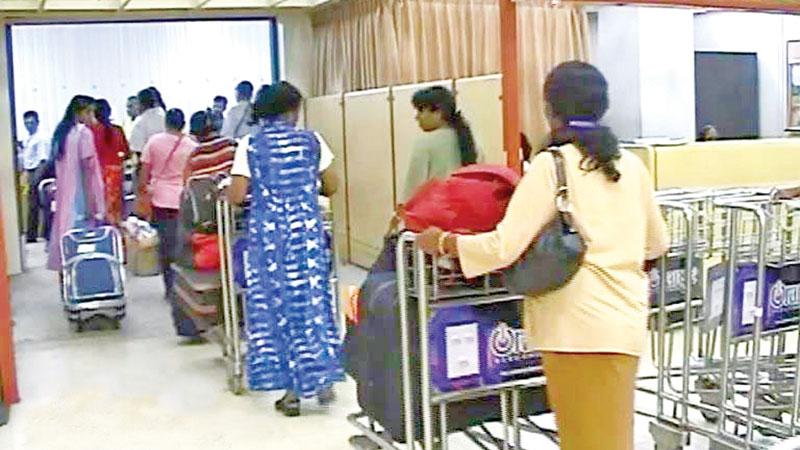
The number of workers leaving Sri Lanka to take up jobs as housemaids in the Gulf region and the Far East has soared by more than 16% in the past year. Saudi Arabia, Kuwait and Qatar are the main destinations in West Asia for domestics from Sri Lanka.
Figures for these countries show that 64,965 women left Sri Lanka to work as housemaids in 2018, an increase from 55,884 in the previous year. The reason for the spike is not clear, but there are fears in recent years about restrictions being brought in by the Government, including, to obtain family certificates, which may have forced women to go abroad without officially registering. In such an event, the situation becomes problematic. Workers who are not registered with the Sri Lanka Bureau of Foreign Employment (SLBFE) fall outside the protection of that institution and are susceptible to forced labour, trafficking, as well as unsafe and exploitative living and working conditions.
They become vulnerable to exploitation with little or no means of protection before, during and after their departure from Sri Lanka.
Recruitment brokers often facilitate this process. These ‘sub-agents’ offer other avenues of migration dodging the documentation and delays in processing applications.
Distressing
It is common knowledge that most Sri Lankan housemaids work under ‘distressing’ conditions in West Asia. According to news reports, some housemaids are forced to work 14 hours a day, seven days of the week. The SLBFE receives regular complaints of abuse and non-payment of salary for several months. Some complain of lack of communication between employer and employee. Hence, the status of our migrant women is bleak.
Few women are able or willing to seek legal redress, mainly because they are unaware of their rights, and do not have access to the institutions which could help them.
Problems
Many social workers have mixed feelings about women seeking jobs as housemaids in West Asia. A positive feature is that, it has eased the unemployment problem for women in the rural sector resulting in economic benefits flowing to the villages. On the negative side, it has created many psychological and social problems. Some housemaids have come back physically hurt or disabled and some in deep trauma. Many complain of abuse, duress and harassment. Regretfully, some have even arrived in coffins. According to social workers, another serious problem arises when the mother goes abroad for employment leaving the children in the custody of the father.
The children face torment re-adjusting themselves and in society. In the past decade there has been a dramatic increase in cases of incest in families where the mother is away and the father is left with the children. Some countries in South Asia have studied the seriousness of the issue in depth and taken appropriate action. Pakistan and Nepal have banned their women from leaving their shores as migrant housemaids, a long time ago. The Philippines has set enforceable conditions in all such contracts that ensure a fair treatment to housemaids and have empowered their embassy to enforce the contract.
Services
The SLBFE assures prompt action and assistance to victims and their families; and the International Organization for Migration (IOM) has implemented awareness programs for civil society and capacity building for law enforcement officers to help prosecute offenders in cases of trafficking.
However, most migrant housemaids find it difficult to avail themselves of the benefits, due to migrating through illegal channels.
On the flipside, most of the housemaids do not possess information about the host country, its people, language, work conditions and type of work they are supposed to do. Some training is being given before their departure by the local authorities, but whether it is adequate is questionable.
Particularly, they should have basic communication skills in the language of the host country if they are to work and live there.
Also, the fact that this category of Sri Lankans has never stepped out of their village to see the ‘rest of the world’ makes them ill-equipped and unprepared to face the tasks of a foreign housemaid – whatever the economic benefit may be.
Rights
Of course, under international law, migrants have rights by virtue of their humanity. International human rights instruments, or treaties such as, declarations, are of general application and apply to migrants as well. In addition, attention has been drawn to the obligations of states, under international human rights law, as regards missing and deceased migrants. Many global organizations have urged West Asian governments to ratify the UN Migrant Workers’ Convention, which guarantees their human rights and promises state protection against abuse by employers, agents and public officials.
Lessons
It is time the Government of Sri Lanka considers providing a system to safeguard the dignity and safety of Sri Lankan domestic workers. As a policy, the Government must contemplate a complete ban on housemaids going to work in countries with which the Government does not have a labour welfare pact.
Analysts believe such a ban would force the countries to come to the negotiation table for a welfare agreement. We can take a lesson from India. They have signed MoUs with many countries.
The Government should also begin rolling out mandatory minimum wage requirements for housemaids working in the Gulf and Southeast Asia, failing which they should not be given clearance to travel.
The wage guidelines for female domestics should be a part of a larger policy to protect our women workers abroad.
It is important to mould our so-called ‘housemaids’ into better skilled and better paid professions rather than treating them as tools which bring in foreign exchange for the country and an avenue to relieve our unemployment problems.
